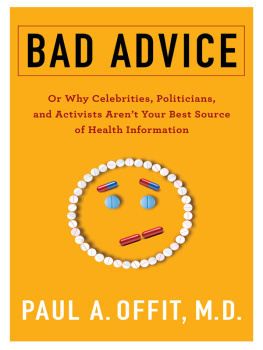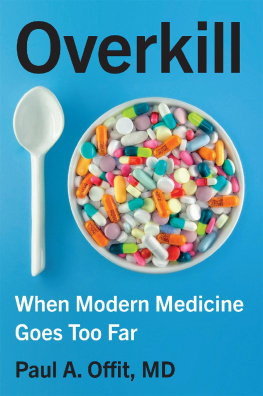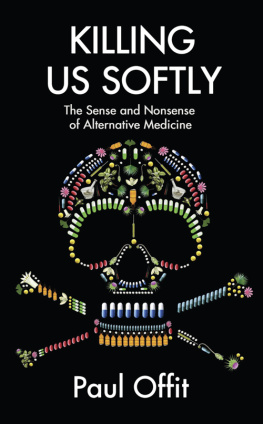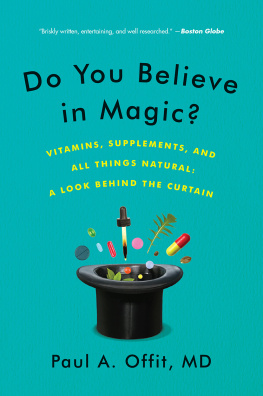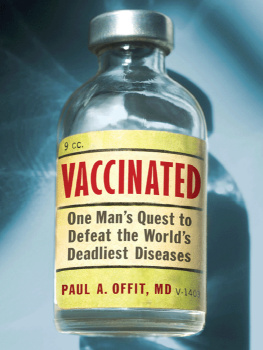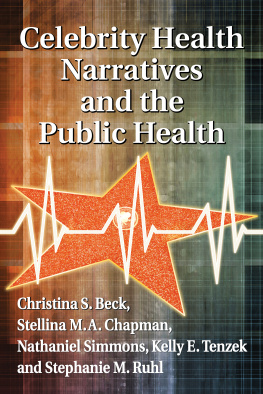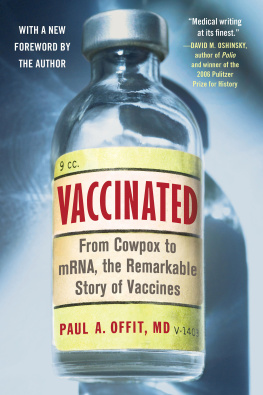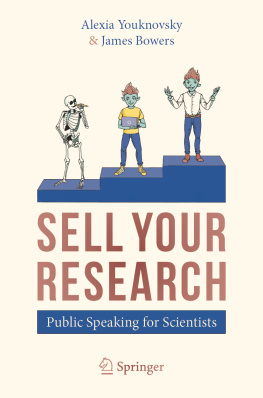Table of Contents
BAD ADVICE
Paul A. Offit, M.D.
BAD ADVICE
Or Why Celebrities, Politicians, and Activists Arent Your Best Source of Health Information
COLUMBIA UNIVERSITY PRESS
NEW YORK
Columbia University Press
Publishers Since 1893
New York Chichester, West Sussex
cup.columbia.edu
Copyright 2018 Paul A. Offit
All rights reserved
E-ISBN 978-0-231-54693-5
Library of Congress Cataloging-in-Publication Data
Names: Offit, Paul A., author.
Title: Bad advice: or why celebrities, politicians, and activists arent your best source of health information / Paul A. Offit, M.D.
Description: New York: Columbia University Press, [2018] | Includes bibliographical references and index.
Identifiers: LCCN 2017056425 (print) | LCCN 2018010525 (ebook) | ISBN 9780231546935 (electronic) | ISBN 9780231186988 (cloth: alk. paper)
Subjects: LCSH: Communication in public health. | Communication in medicine. | Health in mass media.
Classification: LCC RA423.2 (ebook) | LCC RA423.2 .O34 2018 (print) | DDC 362.101/4dc23
LC record available at https://lccn.loc.gov/2017056425
A Columbia University Press E-book.
CUP would be pleased to hear about your reading experience with this e-book at .
Cover design: Noah Arlow
TO MY WIFE BONNIE, WHO STAYED STRONG AFTER EVERY LAWSUIT AND DEATH THREAT, AND TO OUR CHILDREN, WILL AND EMILY, WHO WERE MERCIFULLY OBLIVIOUS.
We live in a society exquisitely dependent on science and technology in which hardly anyone knows anything about science and technology.
CARL SAGAN
CONTENTS
| Question: | How can you tell the difference between introverted scientists and extroverted scientists? |
| Answer: | When introverted scientists talk to you, they stare down at their shoes. When extroverted scientists talk to you, they stare down at your shoes. |
I n 1997, an executive producer at a local Fox station in Philadelphia asked me to appear on her show. It was September, back-to-school month, and the producer wanted to talk about vaccines. At the time, I was an associate professor of pediatrics at the Childrens Hospital of Philadelphia and had been studying vaccines for years. I thought it would be fun.
When I arrived at the studio the producer explained that the segment would have more energy if, instead of sitting at the desk with the two news anchors, I sat in the newsroom. She directed me to a high, unstable chair that rocked with the slightest movement, a cameraman just a few feet in front of my face. Because I couldnt see or hear the news anchors, who were in a room behind me, the producer gave me an earpiece, which fit badly.
The segment following mine involved a legal comedy-drama premiering on Fox called Ally McBeal, starring Calista Flockhart. Ally McBeal featured several lawyers who wore miniskirts to work. Finding this fashion statement intriguing, the producer had asked four models, all in their early twenties, to wear progressively shorter skirts. Talking animatedly among themselves, the models stood next to me. People in the newsroom buzzed around, talking, joking, laughing; one was screaming. My chair rocked back and forth.
At this point, I wondered whether it was possible to be any more distracted. Where were the clowns, the dancing bears, the jugglers, the exotic animal handler searching for his escaped scorpion? Then my earpiece fell out. When I put it back in, I realized that one of the news anchors was asking me a question. My segment, apparently, had started. Dr. Offit, could you tell us what vaccines children get, how many they get, and when they get them?
The actual answer to that question in 1997 would have been
Children receive a vaccine to prevent hepatitis B virus at birth and then at one and six months of age; the combination diphtheriatetanuspertussis vaccine at two, four, six, and fifteen months and again at four years of age; a vaccine to prevent Haemophilus influenzae type b at two, four, six, and twelve months of age; a polio vaccine at two, four, and six months and again at four years of age; the combination measlesmumpsrubella vaccine at twelve months and four years of age, and the chicken pox vaccine at twelve months of age.
Apart from setting the field of health communication back about twenty years, there was no way I was going to remember all of that. The better answer would have been
Children receive several vaccines in the first few years of life to prevent pneumonia, hepatitis, meningitis, and bloodstream infections, among other diseases. Parents should make sure that their children are up to date on their vaccines so that they dont have to suffer these terrible infections.
I didnt give either of these answers. I didnt give the first one because I couldnt. And I didnt give the second one because I was too inexperienced to realize that you dont have to answer the question exactly as asked. Rather I gave a variant of the first answer during which I got lost in the middle, forgetting which vaccines I had already mentioned and stumbling over exactly when they were given. It was pathetic. In fact, it was so pathetic that even the models stopped talking and stared at me sadly. When it was over, the producer escorted me out of the newsroom, told me how much she had appreciated my coming to the studio, and never asked me to appear on her show again.
Since my Fox interview, Ive written books about vaccines, antibiotics, alternative medicine, dietary supplements, megavitamins, faith healing, and scientific discoveries gone awry. In addition, between 1980 and 2006, I was part of a team of scientists at the Childrens Hospital of Philadelphia that invented a vaccine. As a consequence, Ive had many more opportunities to interact with the media. Ive been interviewed on national morning and evening news shows, grilled on comedy shows like The Colbert Report and The Daily Show, collaborated on scientific documentaries on CNN, Frontline, and Nova, and appeared before congressional subcommittees. Ive learned a lot along the way. Now I make a complete ass of myself much less frequently.
One thing I found that I never would have predicted was that I had inadvertently put myself in the crosshairs of powerful forces intent on defeating science: an unholy alliance working against the health of Americans. By standing up against these groups, which include hostile activists and personal injury lawyers, Ive received hundreds of pieces of hate mail, been the target of four death threats, and been threatened with three lawsuits. Ive also been physically harassed. Its been an education.

